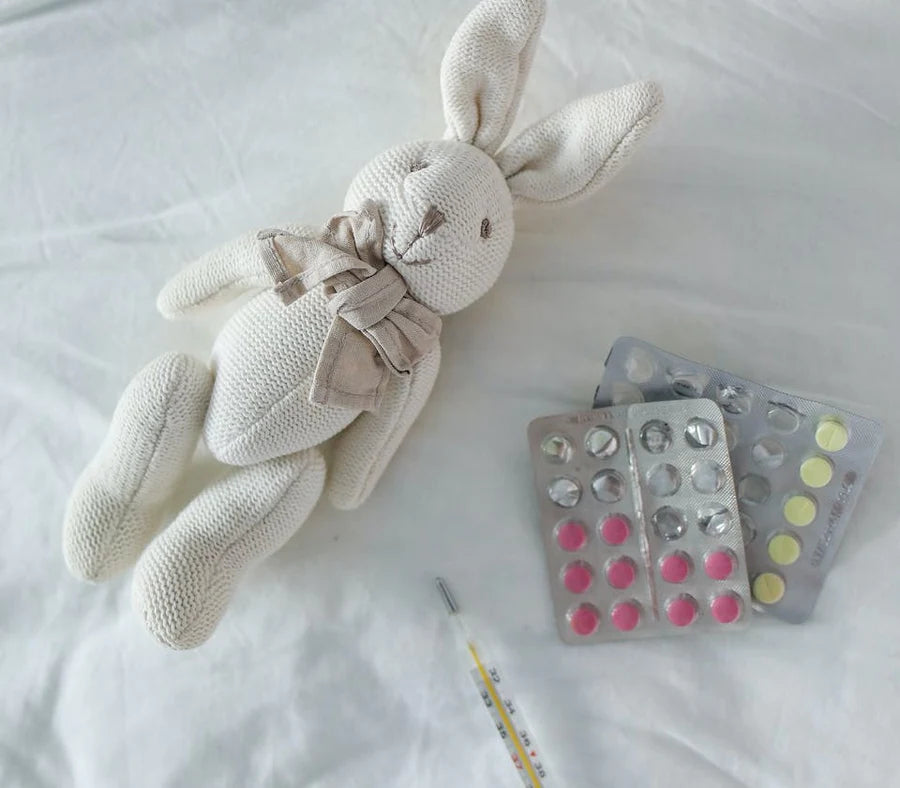How Many Injections for IVF Treatment Are Needed?

By OBGYN Dr. Kenosha Gleaton.
Some of this content has been repurposed from Natalist’s Guide to IVF, written by Halle Tecco and medically reviewed by Dr. Dana McQueen.
In vitro fertilization (IVF) is a type of assisted reproductive technology (ART) that is used to help someone conceive. IVF is a complex process involving multiple procedures, tests, medications, and more.
The IVF Process: A Step-by-Step Guide
The premise of IVF is to increase the efficiency of the human reproductive system. Instead of waiting for ovulation to occur on its own (or tracking it with an ovulation test kit) and hoping that sperm and egg will meet at the right time, creating a fertilized egg, health providers step in to ensure fertilization occurs outside of the body, then transfer the embryo back into the uterus for implantation. [1]
- Ovulation stimulation and monitoring
Before someone starts IVF medications, they will have a baseline transvaginal ultrasound and bloodwork around day three of their menstrual cycle [2]. The purpose of this appointment is to [2]:
- Count and measure the follicles in the ovaries (each follicle contains one egg)
- Look for any significant ovarian cysts
- Measure blood estrogen and progesterone
Based on the results of these tests and someone’s medical history, the healthcare provider will create a customized medication protocol. This is when injections will begin to stimulate the ovaries.
- Egg retrieval
After the injection protocol has resulted in mature follicles, the egg retrieval process will occur. This is a quick procedure that is done under anesthesia. The provider will use a transvaginal ultrasound and a long thin needle to retrieve the eggs. [1]
- Insemination
After the eggs are retrieved, they will be transferred to a lab where they will be inseminated. [1] Fertilization happens within a few hours of insemination.
- Embryo grading and testing
An embryologist will examine, grade, and test the embryos after fertilization. Some of the embryos can also be genetically tested. [1]
- Transfer
Embryo transfer is one of the most exciting parts of the IVF process! This is a procedure that involves the provider inserting the embryo into the uterus using a catheter. [1] The next step is waiting for implantation and testing for pregnancy. Shop early pregnancy test strips >>
Types of Injections Used in IVF
IVF treatment requires a few different injectable medications. The types, dosages, and frequency of injections can vary from person to person. Medications tend to include gonadotropins, like follicle-stimulating hormone (FSH) and luteinizing hormone (LH), human chorionic gonadotropin (hCG), progesterone, Lupron, Ganirelix, and others [1,3-4]:
Gonadotropins: These medications work by stimulating the ovaries to develop multiple follicles for retrieval.
HCG: HCG can be used to encourage final egg maturation and ovulation.
Progesterone: Progesterone is a key hormone for sustaining pregnancy. Progesterone is sometimes used during IVF to help the body prepare for implantation and pregnancy.
Lupron: Lupron is a synthetic hormone that can be used to suppress ovulation from occurring before the eggs are retrieved. Lupron may also be used to encourage egg maturation and ovulation. The effect of Lupron will depend on the treatment protocol.
Ganirelix: Prevents ovulation from occurring too early.
Again, someone’s medical history, hormone levels, and response to IVF medications can all prompt different treatment protocols. You should speak to a healthcare provider if you have questions or concerns about your individual fertility or IVF treatment.
The IVF Protocols: Antagonist and Long Protocol
One of the most commonly used IVF protocols is known as “long Lupron” or “down-regulation”. [1,5] This protocol involves using a medication (like Lupron) to down-regulate the pituitary gland and prevent premature ovulation from occurring. This medication is started on day 21 of the menstrual cycle and given daily for about two weeks. [5] The second medication, FSH, begins around day 3 of the next cycle (while simultaneously taking Lupron) and is given daily for about 8 to 12 days while having regular checkup appointments to monitor the ovarian follicle growth. Once there are enough mature follicles, a final injection of hCG will be given to encourage the release of the eggs. [5] This is known as the trigger shot. This hCG injection is timed almost exactly 36 hours before the egg retrieval procedure. Lastly, progesterone shots may be used from the time of retrieval to about two or three weeks after embryo transfer. [6]
The other commonly used IVF protocol is known as the “antagonist” or “short protocol”. [1,4] This protocol involves the fewest number of injections. With this method, FSH and LH will be given for about 10 days. [4] Around the fifth or sixth day of these injections, an antagonist medication, such as Ganirelix, will be started to prevent premature ovulation. Once there are enough mature follicles, the final trigger shot will be given, which may contain Lupron, hCG, or a combination of the two. [1,4]
There are even more IVF protocol options available that also differ in the type, amount, and frequency of injections. It’s important to speak with a provider directly about IVF protocol options.
How Many Injections Are Typically Needed?
It’s difficult to say how many injections someone will receive during IVF, as the amount can vary greatly depending on IVF protocol, dosage, type of medication, and more. Generally speaking, most people will receive anywhere between 15 to 50 or more injections over the ovarian stimulation and retrieval process. [1-5] If someone is taking progesterone injections following the egg retrieval, the number of injections can quickly increase. If you are concerned about the rigorous injection schedule, speak with your provider. Opting for the short protocol and higher doses of certain medications may result in fewer injections.
Managing the IVF Treatment Experience
IVF can be a very rewarding, exciting, and often challenging experience. There are mental hurdles to conquer, lots of appointments to schedule and stay on top of, and many physical symptoms and side effects. It’s important to prepare yourself for the road ahead as best as you can. Some tips for managing the experience:
- Lean on your loved ones
- Journal
- Meditate
- Find ways to celebrate the little things- whether it’s getting through your first self-injection or completing the egg retrieval process!
- Stay organized
Side Effects and How to Mitigate Them
Many people get worked up about the number of injections during IVF. It’s certainly never fun to prick yourself with a needle multiple times, but you will quickly become a pro! Here’s Halle’s experience with IVF shots, taken from A Guide to IVF:
“During the ovarian stimulation phase, you will get really good at receiving (and giving, if you’re doing your own) shots. I was so nervous about all the shots when starting my journey, but it turned out to be fine. They’re fast, and the discomfort is over before you know it.
For me, I never did my own shots. My husband was my shot-giver, and I have to say he did really well. We made it a ritual. We did the shots in the late evening, after I had taken a hot bath and gotten in my jammies. I used an ice pack to numb the area, and it was over in a cinch! I always had a piece of chocolate ready as a treat, along with a good show to watch right after (my son was created from a round where we watched Schitt’s Creek every night).
The medications cause the follicles in the ovaries to grow. As a result, the ovaries enlarge, especially as you lead up to the egg retrieval. This can lead to some bloating and discomfort in the pelvic area. Bloating, pressure, and mild pain are common but manageable. You’ll want to wear loose clothing and stay cozy during this time. Some over-the-counter pain medications may be helpful; ask your REI what you can and can’t take. “
To summarize, you can expect some tenderness, bloating, pressure, headaches, nausea, mood swings, and other symptoms as a result of the hormones and medications used during IVF. Use over-the-counter pain relief options that have been approved by your provider, numb the injection site with an ice pack, and try to schedule your shots when you know you’ll be relaxed.
Natalist's Role in Your IVF Journey
At the end of the day, every person’s journey to starting a family is different, and no IVF journey is exactly the same. Some will have short and successful treatments, while others may experience multiple rounds and difficult losses. Natalist is here to support your family planning journey. Support nutrition with our women’s prenatal vitamin, get accurate results with home lab tests, or pamper yourself with self-care products. We’re crossing our fingers for you!
References:
- Choe J, Shanks AL. In Vitro Fertilization. [Updated 2023 Sep 4]. In: StatPearls [Internet]. Treasure Island (FL): StatPearls Publishing; 2023 Jan-. Available from: https://www.ncbi.nlm.nih.gov/books/NBK562266/
- Baseline Ultrasounds. Pacific Fertility Center Los Angeles. March 2, 2019. Accessed December 2023. https://www.pfcla.com/blog/baseline-ultrasound
- Details about injectable medications for in vitro fertilization, IVF. Advanced Fertility Center of Chicago. Accessed December 2023. https://advancedfertility.com/ivf-in-detail/injectables-ivf-treatment/
- IVF Medication Protocols for Ovarian Stimulation with Antagonists. Advanced Fertility Center of Chicago. Accessed December 2023. https://advancedfertility.com/2020/09/18/ivf-medication-protocols-for-ovarian-stimulation-with-antagonists/
- Lupron Down-Regulation Ovarian Stimulation Protocol for IVF. Advanced Fertility Center of Chicago. Accessed December 2023. https://advancedfertility.com/2020/09/21/lupron-down-regulation-ovarian-stimulation-protocol-for-ivf/
- The IVF Process Timeline and Calendar – How Long Does an IVF Process Take? Coastal Fertility. May 2020. https://coastalfertility.com/ivf-timeline/
Dr. Kenosha Gleaton is board-certified in gynecology and obstetrics and is the Medical Advisor of Natalist. She received her MD from MUSC and completed her residency at Carolinas Medical Center in Charlotte, NC.
Dr. Gleaton is passionate about women, health equity, and mentoring. She is the CEO of The EpiCentre, an OBGYN spa-like practice, and is a Clinical faculty member of Charleston Southern University. She is also a member of the American College of Obstetrics & Gynecology, the American Association of Gynecologic Laparoscopists, and the American Association of Professional Women.
Reach Out, We're Here
Have questions about your order or products? For the speediest answer, check out our FAQ section. Need something else? Come find us below.
Please keep in mind our regular business hours; Monday-Friday, 9am-5pm CT.
Customer Support
support@natalist.com
Press Inquiries
media@everlyhealth.com
Business & Partnerships
team@natalist.com
Affiliates + Influencers
team@natalist.com
Job Openings
Careers Page

























